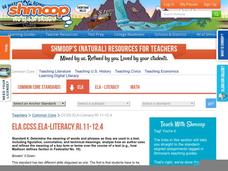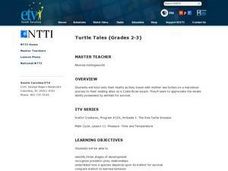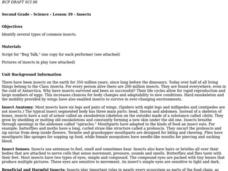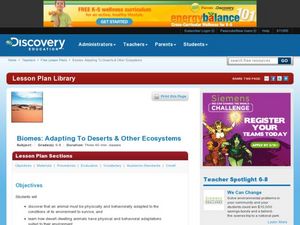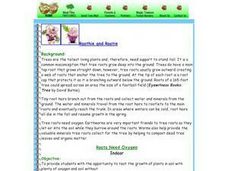Outdoor Learning Center
Outdoor Survival
Which of the following can you survive without for the longest time: water, food, or a positive mental attitude? The answer may surprise you. Guide learners of all ages through games, activities, and discussions about surviving in the...
Calvin Crest Outdoor School
Survival
Equip young campers with important survival knowledge with a set of engaging lessons. Teammates work together to complete three outdoor activities, which include building a shelter, starting a campfire, and finding directions in the...
Curated OER
How to Survive the Common Cold
The way people handle the aggravating, but potentially dangerous, common cold has produced many home remedies and approaches. In this activity, students will identify symptoms in the stages of a common cold and then create a booklet...
Curated OER
How to Survive the Common Cold
Students identify symptoms in the stages of a common cold. They create a booklet about treating the common cold.
Shmoop
ELA.CCSS.ELA-Literacy.RI.11-12.4
Determining the meaning of a word based on context clues or marking how the meaning of a term evolves in the course of a document can be a challenge in more complex text. Give your pupils an opportunity to practice this skill with a...
Curated OER
Outdoor Survival
Students are introduced to basic outdoor survival concepts. They identify the seven basic needs for survival. Students describe the symptoms and treatment for frostbite and hypothermia. They compare and contrast the value of different...
Polar Trec
Do Microorganisms Live in Antarctica?
Can microorganisms live in the dry, cold climate of Antarctica? Young scientists view a research project measuring microorganisms in the Taylor Glacier. They record the findings from dirty ice, clean ice, boots, sediment, and more. Then...
Curated OER
Manduca
Students investigate the basic survival needs of both hornworms and humans. They compare and contrast the them by making a class list.
Curated OER
Turtle Tales
Students watch videos and fill out worksheets about the turtles and their journey to the Costa Rican beach. In this turtles lesson plan, students learn and discuss survival, predator and prey, and stages of development.
Curated OER
Some Like It Hot, Some Like It Cold
Students are explained that thermophiles are organisms that have optimal growth temperatures above 50oC. They investigate the temperature ranges for the growth of common bacteria. Students answer the question of do either of these...
Curated OER
What Makes a Habitable Planet?
Young scholars list conditions necessary for humans to survive. They then mix yeast with a nutrient broth consisting of warm water and table sugar in a plastic bottle, capping it with a party balloon and compare the factors within the...
Baylor College
We Need Water
There's nothing quite like a glass of ice-cold, freshly squeezed lemonade. Lesson seven of this series explains how the water humans need to survive can come in many forms. Teach your class about how much water humans require every day...
NOAA
Vertebrates II
Mammals of the ocean unite! Or not. The 20th installment of a 23-part NOAA Enrichment in Marine sciences and Oceanography (NEMO) program investigates how warm-blooded marine mammals survive in water. In the class activity, learners use...
Aquarium of the Pacific
Turn a Cow into a Whale
Third graders explore animals that might have a common ancestor and resemble one another. For this cow and whale lesson, 3rd graders recognize the similarities between the whale and the cow. Students complete worksheets based on the...
Curated OER
Insects
Second graders brainstorm and identify several types of common insects. They play bug bingo, building bugs and an insect tree, observing real insects in the classroom and examining some of the things insects make.
Curated OER
Biomes: Adapting To Deserts & Other Ecosystems
Students examine how animals must be adapted to the conditions of its environment to survive. For this biomes lesson students research desert adaptations then discuss how these animals have survived.
Curated OER
Great Salt Lake
Fourth graders make an ecosystem that brine shrimp can live in and take data as to what level of salinity the water is, how cold it is, and other data that students may think is important. They also hypothesize and predict the outcomes...
Curated OER
Desert Animals
Students survive within an ecosystem, an animal must be physically and behaviorally adapted to the conditions of its environment.
Curated OER
Roots Need Oxygen
Pupils investigate the growth of plants in soil with oxygen and soil without oxygen. They discuss what roots need to survive, and chart the growth of two plants to analyze the difference between plain soil and soil with two earthworms.
American Museum of Natural History
Microbes Coloring Book and Scavenger Hunt
Coloring pages showcase microbes—bacteria, viruses, and protists. Scholars have the option to download a coloring book and scavenger hunt or color the page directly on the computer. Three paragraphs describe each microbe.
Curated OER
Taiga
In this taiga worksheet, students read a short article describing what a taiga is and then answer 10 multiple choice, true or false or short answer questions relating to the article.
Curated OER
A Hidden Beauty
Expose the beautiful mystery of bulbs as young botanists learn all about these fascinating plants. They glean information from a short text before observing actual bulbs (consider an onion), and comparing their findings with predictions....
K12 Reader
Eastern Woodland Natives
Supplement your social studies instruction with a reading passage about the Eastern Woodlands. After reading the passage, learners respond to five related questions.
Curated OER
Animals Word Search Puzzle
To make the classic word search more challenging and academic, this animal-terms puzzle has scholars solving clues to determine the words they find. Fifteen clues give detailed definitions of biology terms such as carnivore, reptile,...






